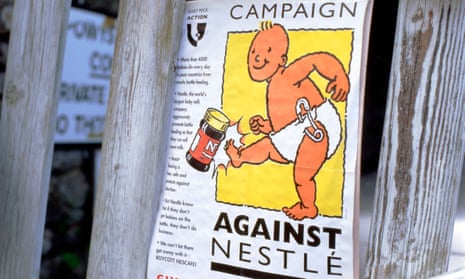The Swiss multinational Nestlé has been accused of violating ethical marketing codes and manipulating customers with misleading nutritional claims about its baby milk formulas.
A new report by the Changing Markets Foundation has found that Nestlé marketed its infant milk formulas as “closest to”, “inspired by” and “following the example of” human breastmilk in several countries, despite a prohibition by the UN’s World Health Organisation (WHO).
The study, which analysed over 70 Nestlé baby milk products in 40 countries, also found that Nestlé often ignored its own nutritional advice in its advertising.
In South Africa, the firm used sucrose in infant milk formulas, while marketing its Brazilian and Hong Kong formulas as being free of sucrose “for baby’s good health”.
In Hong Kong, it promoted its baby milk powders as healthier – because they were free from vanilla flavourings – even as it sold other vanilla-flavoured formulas elsewhere in the territory.
Nusa Urbancic, campaigns director for the Changing Markets Foundation told the Guardian: “We have come to understand that companies manipulate consumers’ emotional responses to sell a variety of products, but this behaviour is especially unethical when it comes to the health of vulnerable babies.
“If the science is clear that an ingredient is safe and beneficial for babies then such ingredients should be in all products. If an ingredient is not healthy, such as sucrose, then it should be in no products. Nestlé’s inconsistency on this point calls into serious question whether it is committed to science, as it professes to be.”
Nestlé is the global market leader for infant milk products with a market share of close to a quarter. It has been dogged by the advertising issue since a 1974 report called The Baby sparked a worldwide boycott.
In 1981, the WHO adopted a strict code of advertising banning the promotion of baby milk products as being in any way comparable to breastmilk. Nestle insists that it follows the code “as implemented by national governments”.
But the new report finds that it touted products in the US such as Gerber Good Start Gentle powder as “our closest to breastmilk”, and sold its Beba Optipro 1 powder in Switzerland as “following the example of breastmilk”.
Similar Nestlé products in Hong Kong and Spain were advertised as being “inspired by human milk”, and having “an identical structure” to breastmilk.
The company did not respond to specific questions about the new study but a Nestlé spokesperson told the Guardian it supported WHO recommendations and believed that breastmilk was, wherever possible, “the ideal source of nutrition for babies.”
However, not all infants could be breastfed as recommended and “where needed or chosen by parents, we offer high quality, innovative, science-based nutritional products for mothers and infants from conception to two years of age,” the employee said. “We market these products in a responsible way at all times, and the claims made on our products are based on sound scientific evidence.”
Some academics, though, have highlighted the way that language used by corporates to promote infant milk formulas can sometimes mislead consumers about this.
Last year, Prof George Kent of the University of Hawaii wrote that describing a product as “closer to breastmilk … is not the same as saying it is close to breastmilk. New York is closer than New Jersey to Paris, but that does not mean New York is close to Paris.”
Breastmilk is a “personalised” and continuously changing nutrition between mother and child that contains live substances – such as antibodies and immune-system related compounds – which cannot yet be replicated in a lab.

Comments (…)
Sign in or create your Guardian account to join the discussion